After a week of negotiations, the European bloc has agreed new sanctions at a time when, according to EU diplomacy chief Josep Borrell, Russian President Vladimir Putin’s regime has begun using winter as a weapon against Ukrainians , deliberately depriving them of electricity or drinking water through attacks on infrastructure.
“We will continue to target the economy and those who help wage this brutal war,” Borrell said on Friday.
EU countries will again restrict the export of chemicals, nerve agents, electronic and computer components that Russia could use for military purposes. This includes, among other things, night vision equipment or navigation systems.
EU ambassadors agreed on further sanctions against Russia
The war in Ukraine
The export ban will cover, for example, engines used in drones, which Moscow uses to attack Ukrainian civilian targets and energy infrastructure. It will also apply to exports to other countries that supply military equipment to Russia, such as Iran.
Money directed towards the extraction of critically important raw materials will be exempt from the mining investment ban.
The list of people and entities whose assets have been frozen and who travel within its territory prohibited by the union will expand on Friday to 1,557. The new list will include 190 people and companies, including 12 members of the government, ten judges of the Constitutional Court , including its president, and four dozen lawmakers. The sanctions will also apply to five Russian political parties. Dozens of representatives from the military and separatist regions will also speak, inter alia, in connection with the abduction of Ukrainian children in Russia. Two more Russian banks and a branch in an EU country will also be added to the list.
The broadcast of other TV channels that spread Russian propaganda will be banned: NTV, Rossiya 1, REN TV and Pervyj kanal. Several journalists and public figures will also be punished in this regard.
Moldova cuts off Russian and pro-Russian TV broadcasts in the country
The war in Ukraine
Under original plans, foreign ministers were due to approve the package earlier this week, but final negotiations on its form have been stalled by several disputes. In addition to Hungary’s efforts to remove several people close to the Kremlin from the proposed list, it was mainly a request for the export of Russian fertilizers to less developed non-European countries suffering from food shortages. While current sanctions do not directly ban this export, it is complicated in some cases by sanctions relating to the property and business transactions of long-term Russian oligarchs in the agricultural and food industries.
After the pressure from several countries, especially from Western Europe, the new package will allow in exceptional cases to allow these people, for example, to make payments or use EU ports for the transport of fertilizers, which they it was possible until now. Poland and other states that rejected this release eventually joined it.
The sanctions will officially enter into force with their publication in the EU Official Journal, which is expected to take place later on Friday.
The United States has imposed sanctions on one of the richest Russians
America


